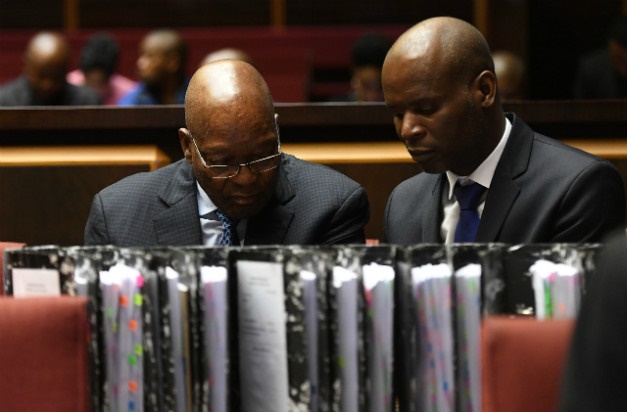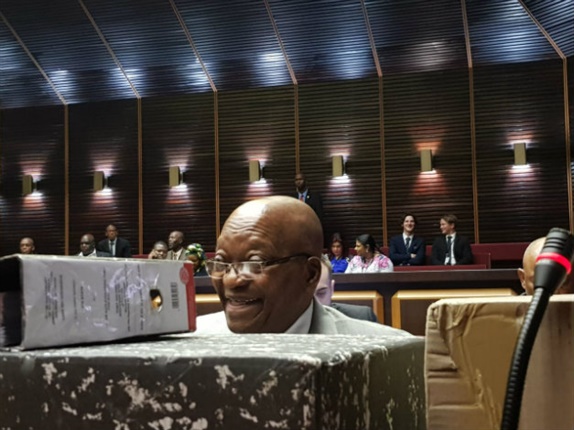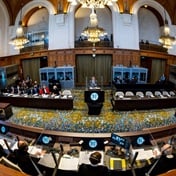
WATCH LIVE:
(Courtesy of SABC)
23 May 2019
The bench returns and resumes proceedings only to stand the matter down until 09:00 tomorrow. Mnguni has asked counsel to try and reach an agreement.
Court adjourns.
23 May 2019
Sikhakhane wants to read a letter into the record. He complains the NPA has not handed this document to him.
"The document I am about to read, in March 2018, shows this NPA was asking about an investigation into bribes and the meeting between Penuell Maduna and Thabo Mbeki," he says.
Trengove objects to the introduction of new evidence.
There is now a short adjournment while the bench discusses the matter and reaches a decision.
23 May 2019
Former president Jacob Zuma cracks a smile during court proceedings in the KZN High Court in Pietermaritzburg. (PHOTO: Kyle Cowan/News24)

23 May 2019
Sikhakhane accuses Trengove of purposefully misreading the Harms judgment, which he says they are "seeking refuge in".
"Harms does not mean you can violate the Constitution in pursuit of an accused person," he says.
23 May 2019
Sikhakhane: We are then told again by Mr Trengove, that the period of Mpshe...there is a theory, that seems to exists in the NPA, that the decision of Mpshe favoured Mr Zuma. It is utterly opportunistic to blame an accused citizen for a situation where a political party sues the State.
Sikhakhane: No one gives you evidence of this grand theory of Stalingrad...just because Mr Kemp describes litigation, elegantly, in this way...
Sikhakhane: The action of Mpshe cannot be blamed on Mr Zuma. There is another grand theory that Mpshe made this decision because he is a "Zuma-lite". This is speculation, there is no evidence.
23 May 2019
Sikhakhane: Mr Trengove says Mr Ngcuka took a decision on 23 August 2003, and although it was wrong, it was in good faith. He admits it was an anomaly. It's unusual, but it's not uncommon, he said. The fact of the matter is that Mr Ngcuka himself describes his action as an anomaly. I am submitting to this court, it is common cause it was wrong, and it was an anomaly.
Sikhakhane: Maybe we blame Mr Pikoli too much. We accept that Mr Pikoli as he was described, is a good man. When we criticise that decision, we are not saying Mr Pikoli is a bad man.
23 May 2019
State argues against Zuma stay of prosecution: Stalingrad brought us here
In 2007, former president Jacob Zuma's long-time lawyer Kemp J Kemp told the KwaZulu-Natal High Court in Durban that Zuma's litigation was "more like Stalingrad. It's burning house to burning house."
Now, more than a decade later, Zuma's Stalingrad defence is continuing, the State has argued before the KwaZulu-Natal High Court in Pietermaritzburg.
Advocate Wim Trengove, SC, argued against Zuma's application for a permanent stay of prosecution and took the court through the decade-plus of litigation Zuma initiated to delay his prosecution. This is known as a Stalingrad defence.
Zuma, Trengove submitted, is also responsible for the delay in his own corruption case, but is asking the court to grant him a permanent stay of prosecution because of the self-same delay.
23 May 2019
Sikhakhane: He starts by asking this court to disregard the 'spy tapes'. They then say, in those periods in which we as the NPA were wrong...even when the NPA commits what it accepts is wrong, the accused person is to blame. That is wrong.
Sikhakhane: Mr Trengove fudges another point, by hyperbole. He says yes, Mr Ngcuka was wrong. I submit to the court that the number of issues I wish this court to consider, are not disputed.
23 May 2019
Advocate Sikhakhane rises to his feet. He is replying to Trengove.
Sikhakhane: Mr Trengove has said many things. Some are correct, but some are not. One cannot come to court and blame everything one one party.
23 May 2019
Breitenbach wraps up his submissions.
Trengove rises, he wishes to make a final point. He is again pointing out that if you ask for a delay today, you cannot complain about it tomorrow. It's not a blame game, the accused exercised his rights.
The fact of the matter is [Mr Zuma] chose, in the exercising of his rights, a route that caused the delay. But you cannot then complain about it tomorrow.
23 May 2019
Even if Thales went to trial in 2006 or 2007, it is likely Mr Thetard would not have testified then.
Thales has in no way shown it would not be able to put up a defence. We submit it is trite that Thales should go to trial, and the application for a stay of prosecution should be dismissed.
A trial judge will have the powers to offer Thales remedies if it is unable to defend the evidence produced by the State.
23 May 2019
Breitenbach says the court should be "deeply skeptical" about submissions made by Thales.
23 May 2019
Breitenbach tells the court the whereabouts of some witnesses are still unknown. Thales has told the court it also cannot locate the individuals, and it is unlikely it will do so.
23 May 2019
Breitenbach: Thales does not allege the conduct of the State has resulted in the disappearance or destruction of evidence. The erosion of evidence over time is limited in this case, because it was very well investigated up to 2006.
23 May 2019
NOTE: Strong evidence, proven in court, yet 14 years later, still no trial.
It must be admitted at this stage that the average Joe would not have been able to delay such serious charges if they were in Zuma or Thales' shoes.
It cost Zuma somewhere between R16m-R32m to conduct the various litigation proceedings over the years.
It's mind-boggling, especially when you consider it is public money, not his personal earnings.
- News24 reporter Kyle Cowan
23 May 2019
For this case, the following factors weigh heavily: Fairness to the public, public confidence, the need to address societal ills, such as the offences Thales and Mr Zuma are charged with...
"The evidence against Thales is very strong," Breitenbach says. "As is evidenced by the Shaik trial."
23 May 2019
Breitenbach turns now, briefly, to the nature and seriousness of the offence.
Thales has conceded the charges against it are serious. We submit the concession is rightly made, as it deals with corruption charges involving the then-second most powerful individual in the executive of South Africa.
23 May 2019
"There is no reason to think that if the State had not opposed the DA matter, that Mr Zuma would have followed suit," Breitenbach says.
Earlier, Advocate Trengove pointed out that the DA's quest to have Mpshe's decision to not prosecute Zuma set aside, took seven years to be heard due to interlocutory applications that delayed the matter.
The NPA opposed the DA's applications, and opposed the DA's standing "shoulder to shoulder" with Zuma.
23 May 2019
If the court does not accept this, Breitenbach asks the court to consider this: Thales and the State were jointly responsible for the delay in 2004.
Mr Zuma and the State are jointly responsible for Mr Mpshe's decision, and so jointly responsible for the delays.
23 May 2019
"They chose the election that had the inevitable result of delaying the trial (by challenging the search warrants in civil proceedings)," Breitenbach says.
If they had gone the other way, and raised this matter in trial, there would have been a number of different consequences.
"The matter would not have been struck from the roll. There would have been no need for Mr Zuma and Thales to be re-indicted.
"The controversy surrounding the timing of their re-indictment, would not have occurred.
"The ill-fated decision of Mr Mpshe, would not have happened.
"One way or the other, this case would have been wrapped up, sometime in 2007."
23 May 2019
Judge Poyo-Dlwati is looking for the middle ground - she asks if the blame does not belong to both parties.
23 May 2019
Breitenbach: Thales and Mr Zuma are responsible for the delay in the matter from 2006, when they launched challenges to the search warrants. The State would have been ready to proceed with the trial in July 2006.
Secondly, the State's case would not have been struck from the roll in September 2006.
Instead of proceeding with civil litigation before the trial started in 2006, to challenge the search warrants, Zuma and Thales could have gone to trial and objected to the addition of the evidence obtained in the searches. They had an election to make. They must now live with that choice.
The route they chose, says Breitenbach, is the generally undesirable route.
23 May 2019
Judge Steyn to Breitenbach: Really strictly speaking, the delay has been caused by the NPA.
23 May 2019
Mnguni is putting it to Breitenbach that the NPA had time to institute charges against Thales before the trial started in October 2005, after Thetard had pulled a fast one and filed a second affidavit that essentially broke the agreement between Thales and the NPA.
23 May 2019
Judge Steyn asks Breitenbach whether he believes he can still say Thales was responsible for the delay, when the NPA and Ngcuka were aware that Thales had been dishonest (there was an agreement that the NPA would not charge the company if Alain Thetard deposed to an affidavit confirming he was the author of the encrypted fax).
Thetard later filed a second affidavit, saying he was indeed the author, but he had never sent it. He had crumpled it up and thrown it away.
Breitenbach says Ngcuka acted in good faith, and stuck to the deal.
Judge Mnguni interjects: "Just because Mr Ngcuka is now gone, does not mean that the NPA should not honour that agreement."
23 May 2019
Breitenbach submits that Thales is responsible for the delay in the matter from 2004 to date.
23 May 2019
Breitenbach is currently taking the court through the timeline in the history of litigation in this case, which is quite extensive.
23 May 2019
Thales was first charged on November 4, 2005. The prosecution came to an end when the matter was struck off the roll in September 2006. The company was charged again in late 2007, but the charges were withdrawn in 2009. It was then charged again in March 2018.
23 May 2019
Back from the lunch adjournment, and it's all about Thales now, and its application for a permanent stay of prosecution. Advocate Andrew Breitenbach starts with matters relating to the delay, and who is responsible for it.
23 May 2019
Trengove spent some time making submissions on arguments by Thales that former NDPP Shaun Abrahams had acted unlawfully in reinstituting prosecution against the company.
Essentially, Advocate Anton Katz argued for Thales that Abrahams relied on the wrong sections of the NPA Act, which the State has argued is not the case.
Trengove wraps up his submissions, and says that "leaves only our submissions on the Thales delay complaint" which Breitenbach will deal with.
The lunch adjournment is called. Back at 14:00.
23 May 2019
Trengove's full final submission on Zuma:
"There is a high risk that if Mr Zuma escapes prosecution, that he will be seen to have received special treatment because he is an important and a powerful man. He is accused of corruption, racketeering, money laundering and fraud in high public office.
He managed to avoid prosecution in the highest public office.
He managed to do so by using to the hilt the Constitutional legal system available to him, at public expense of between R16m and R32m.
As a result of his exercise of those rights, the trial was delayed. We submit that there is a high risk that if his trial is now finally stopped, that it would be seen and understood as a final victory of a powerful man exploiting to the hilt the options available to him to delay. Resulting ultimately in an undue delay in his prosecution.
It is important in the maintenance of the rule of law, for all people to be seen to be treated equally. For that reason, it is important too, for Mr Zuma to be seen to be treated the same as others would have been too."
23 May 2019
Trengove moves on to what he says was Zuma's failure to prove exceptional circumstances.
Trengove points out that Zuma denied attending a meeting with Thetard in March 2000 (where Zuma was allegedly paid a bribe), in an affidavit he gave in 2003.
"There are two reasons for this. Either he is right, and the meeting never took place. Or he forgot about it. Which means his loss of memory occurred in 2003."
"He is no worse off today then, than he was in 2003."
23 May 2019
Steyn puts it to Trengove that Zuma has suffered reputational harm since 2003, when Ngcuka announced he would not be prosecuted.
Trengove submits the reputational harm Zuma has suffered is not as a result of the delays, but the question should be, has he suffered more harm as a result of the series of damning court findings?
"The reputational harm was severe and overwhelming even. But not as a result of any delay. But as a result of his association with Mr Shaik," Trengove says.
The fact of the matter is, he adds, that Zuma's political career "flourished" - despite the harm he claims to have suffered. He was fired from Cabinet by Mbeki because of the Shaik trial, but he still went on to become president.
"So much for reputational harm," Trengove says.
23 May 2019
Trengove: "I have no doubt Mr Zuma has suffered severe reputational harm as a result of the prosecution. But the issue is whether Mr Zuma has suffered any greater reputational harm as a result of the delay. I submit he has not suffered any more harm to his reputation."
23 May 2019
Trengove submits the decision by Ngcuka in 2003 brought about a delay of only 22 months.
Trengove: "We submit with respect, that there was no delay after Mr Pikoli's decision (in 2009), about which Mr Zuma can complain, because he was either the cause, or complicit in, all of the causes of delay after that date."
23 May 2019
Trial prejudice is, as an example, when a lengthy delay results in the loss of evidence. But this can only be true if there is no solution (remedy) for this problem.
23 May 2019
Trengove now moves onto the "ultimate test" for a stay of prosecution. So this is the biggest hurdle Zuma and Thales had to cross.
This is undue delay, and real trial prejudice.
23 May 2019
He now moves onto the Browse Mole report.
"It is a red herring. It has nothing to do with this case. Mr Pikoli has explained this."
Zuma's lawyers argued on Monday that the Browse Mole report proved a conspiracy existed to get rid of him.
23 May 2019
"Mr Mpshe succumbed to Mr Zuma's representations. There was no violation of Mr Zuma's rights," Trengove states.
23 May 2019
Trengove says "it is an odd attack made by Mr Zuma" relating to Zuma's complaint over Mpshe's withdrawal charges.
"He invokes Mphse's withdrawal statement not as a criticism, but as evidence of misconduct by the NPA."
The High Court and SCA judgments, which found Mpshe's decision to withdraw the charges was unlawful and irrational, leads to the withdrawal statement being rubbished.
23 May 2019
Trengove now moves onto the complaint by Zuma over the Pikoli decision to reinstate charges.
What it boils down to is this: Pikoli would have been remiss to not prosecute Zuma, in light of the damning evidence that emerged during the Shaik trial.
Trengove calls the indictment of Shaik "devastating" to both him and Zuma.
Pikoli decided to announce his decision to prosecute Zuma in light of the findings in the Shaik trial, which had resulted in a massive public interest in the matter.
23 May 2019
Mr Zuma complains that he should have been charged with Mr Shaik, and then he would have had the advantage of cross-examining Mr Shaik.
One does not know what Mr Shaik would have done, had it been a joint prosecution.
If they had been charged together, he (Shaik) would not have been a compellable witness.
"An accused doesn't have a right to have his trial designed to his best advantage," Trengove submits.
"In respect of the decision by Mr Ngcuka, we submit it was entirely lawful."
23 May 2019
Ngcuka is criticised for making an announcement that he would be prosecuting Shaik, but not Zuma on August 23, 2003.
Trengove submits that the NPA was at that time, young and untested. Ngcuka knew the connection between Zuma and Shaik would become clear in the indictment to be filed shortly.
He felt it necessary to explain to the public why the NPA was charging the common man, Shaik, and not the deputy president.
"It was an understandable and good faith explanation to protect the integrity of the NPA," Trengove adds.
Another argument put forth by Zuma's legal team is that it was a violation of the NPA Act not to charge Zuma.
23 May 2019
Judges Steyn and Poyo-Dlwati have questions over why Ngcuka called together a team of prosecutors to look at the case again, before he made his decision.
Steyn wants to know why Ngcuka went to outside counsel to seek advice.
Trengove argues that prosecutors in a case sometimes are biased toward prosecuting, and it was a wise decision by Ngcuka to have a team look at the case and advise him.
Far from detracting from the integrity of the prosecution, Ngcuka seeking insights from an outside counsel should be commended, he adds.




 Publications
Publications
 Partners
Partners























